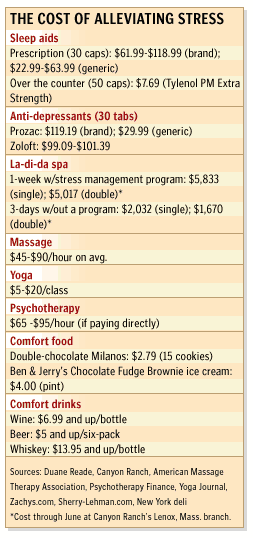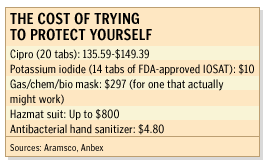
NEW YORK (CNN/Money) -
There's nothing like a war, the threat of anywhere-anytime terrorism, and a brutal job market (to say nothing of stocks) to give your cortisol levels a nice bump up on the charts.
Add to that all the other things in modern life that make you feel out of control and you've got yourself a handy recipe for stress.
My typical reaction to stress in recent months has been occasional insomnia, accompanied by knots in the stomach and fantasies of moving to Montana. Apparently I'm not alone.
"Everyone's stress system is trigger-happy," said Kristine Huffman, a psychotherapist in the stress management program at Canyon Ranch in Lenox, Mass.
Yoga teacher Judith Lasater, who specializes in restorative yoga in San Francisco, has found her students "are craving more relaxation and relief. People can't get enough of doing nothing." That's because in a 24/7 world, she said, "we don't have boundaries on our time anymore."
Many of Huffman's patients hail from the financial services industry, notable lately for its layoffs and a swell in angry clients who've lost their shirts. She's seen a cornucopia of distress signals: sleep problems, digestive disorders, overeating, headaches, you name it.
Helping the stress industry
Of course, free-floating stress hasn't hurt spas, psychotherapists, yoga teachers, massage therapists and, I'm guessing based on my own behavior, cookie and ice cream manufacturers.

Drugmakers have benefited, too. In 2002, we bought nearly $17.2 billion worth of anti-depressants and anti-anxiety drugs (up from $15.5 billion in 2001 and $13.5 billion in 2000), according to data from NDCHealth, a healthcare information services company. And we spent $1.1 billion last year on Ambien and Sonata alone, just two of the many prescription sleeping aids available, to say nothing of the over-the-counter brands.
Some people, wishing to gain control over the unknown, have invested in protective gear to be used in the event of chemical, biological or nuclear attack. Even my boss bought a $20 gas mask online. (I tried telling him he wasted his money. Experts say for such safety products to help, you need to be trained how to use them and they need to be fitted properly.)
Anyway, all this to say it can be costly -- or, in my case, highly caloric -- to let stress get the better of you.
Fear and control
Probably the cheapest way to manage stress is to manage your attitude about all the madness going on these days.
Take the threat of terrorism. Generally speaking, "our fear is driven by the dread factor," said David Ropeik, director of risk communication at the Harvard Center of Risk Analysis. That is, the more awful we perceive a type of death to be, the more afraid of it we are, even if the chances of us dying that way are small. Case in point: shark attacks. If you just went by the numbers -- last year, there were all of 60 unprovoked shark attacks worldwide, down from 72 in 2001 -- you wouldn't be as afraid of them, he argued.

Likewise, Ropeik said, "we're much more afraid of a risk when we don't have any control over what's happening." That may account for why many people feel safer driving than flying, despite the fact that far more people die in car accidents than plane crashes. In our quest for control, we actually may incur more risk, he said.
That's not to say trying to take control is always a bad thing. To the contrary, Ropeik said, doing small things that give you a greater sense of control can reduce your stress levels and, by doing so, improve your immune system, since the two are often linked. "The challenge, though, "is to gain control, but in ways that don't raise risk," he said.
If you're keen to do something, it's smart to take the kind of precautions you might take for any emergency -- making a contact plan with your family, having battery-powered sources of light and communication, keeping extra bottles of water on hand and other suggestions like the kind offered by the U.S. Department of Homeland Security at Ready.gov.
On the other hand, spending good money for a home bunker or an ineffective gas mask from the saveyourbutt.coms of the world seems wasteful.
How afraid is Ropeik of a terrorist attack? "I think the risk is real but very low to the average American," he said.
Something to ponder next time I'm wide-eyed at 4 a.m., wondering why I ever tore up my prescription for Ambien.
Jeanne Sahadi writes about personal finance for CNN/Money. She also appears regularly on CNNfn's "Your Money," which airs weeknights at 5 p.m. For comments on this column or suggestions for future ones, please e-mail her at everydaymoney@cnnmoney.com.

|

